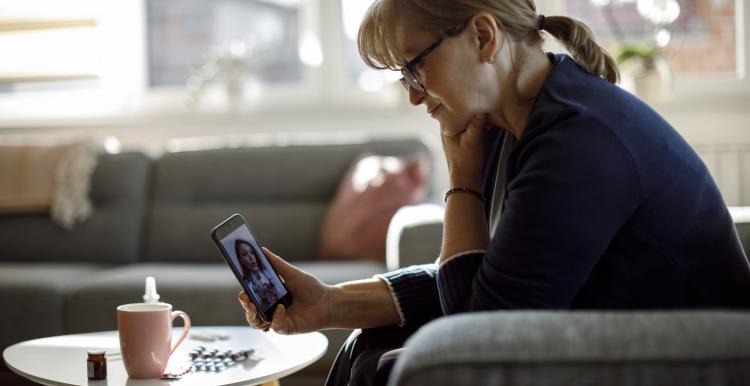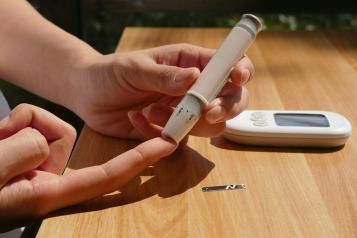People told us they would rather call or visit their GP surgery, than go online

In our Online GP Services Report, 53 per cent of the 500 respondents said they would prefer to contact their GP surgery via telephone or in-person, rather than use online services.
The drive towards the digitalisation of GP practices has given some patients greater choice, convenience and flexibility. However, online offerings vary significantly between GP practices and some people are unable to use this type of technology at all.
Healthwatch Hertfordshire was commissioned by local NHS leaders to ask Hertfordshire residents about their experiences of using online GP services and find out what is working and how services could be improved.
What did people tell us?
Two thirds of respondents had used online services to contact their GP practice and many had positive experiences because they found the systems convenient and easy to use. They also said their GP practice was efficient and responsive when dealing with their requests.
However, a lot of people had concerns about online services including:
Not accessible to all: Many people were concerned about the accessibility of online GP services and the impact digitalisation may have on those who struggle to use technology. The importance of ensuring equal access and patient choice was emphasised.
“They are not accessible to everyone, there’s no visuals/easy read for those with learning disabilities or an option for those with visual impairment.”
Limited choice: Many respondents could not choose how to contact their practice, type of appointment, or which clinician to see – which is particularly important when considering accessibility and reasonable adjustments. Some respondents could only reach their practice online, raising concerns for those at risk of digital exclusion.
“I think it is really bad that this is the only option available. It will be interesting to see what happens when there is a computer outage or hack.”
Difficult to use: Half of our respondents found navigating online systems frustrating and felt forms were repetitive and irrelevant. Some felt it was impersonal, inefficient and should be more straightforward and user-friendly.
“The automation in online triage is inadequate and too often reverts to call 111 instead of actually offering contact. I end up “gaming” the questions to get the appointment I actually need.”
Problems booking appointments: Most told us they were unable to book appointments online, or were limited to the type of appointment they could book, and wanted more appointment types to be made available to reduce the need to call or visit their GP practice.
“You have to go through 4 million irrelevant questions to book a simple appointment. You have to choose what it is in regard to from limited options. For example there is no option for gynae related issues, so you have to select something different.”
Not enough availability: Many people said they could only access online services during GP opening hours and sometimes online options closed early in the day. They said they wanted greater availability so people with work and other commitments could submit requests.
“The online consultation closes when they have had too many enquires. Sometimes by 9am, then you have to wait until the next day. It is not user friendly and is very impersonal.”
Poor communication: Half of our respondents reported inconsistencies, or requests that had been ignored, by their GP practice. This unpredictability discouraged many from contacting their practice online. Patients wanted automated acknowledgements of their requests with clear response timelines.
“The surgery does not accept GP appointments at all unless the online system has been done first. Sometimes that system sends a message saying ‘Make a face to face appointment’ but when I call to make one, I am told I must fill in online first and then I have to try and persuade the receptionist that I have been told by the system.”
Uncoordinated records: The duplication of online platforms confused many people and uncoordinated records risked creating gaps in medical information. Some said receptionists were unaware of the online services on offer, limiting the support they could provide.
“It appears to be a complete mess. There is a practice website/patient access and the NHS App. Too much duplication, not enough integration.”
What happens next?
We have shared the findings above with the NHS and made the following recommendations for improvement. We will continue to monitor progress and feedback to patients, so people know what changes have been made.
- Increase the availability of online GP services
- Make online GP services easier to use
- Allow patients to book appointments online
- Give patients more choice and make online GP services more accessible
- Improve communication between patients and GP practice staff
- Ensure multiple pathways (eg: telephone, in-person and online) are available for patients to contact their GP practice.
“We would like to express our gratitude to everyone who contributed to the Healthwatch Hertfordshire report on Online GP Services. We commissioned Healthwatch to conduct a survey to gather patients' perspectives on various aspects of GP online services. This included how they accessed the services, their ease of use, suggestions for improvements, and their overall experiences with them.
The feedback we received will be invaluable in shaping our future efforts in this area. Specifically, it will help enhance our communication with patients regarding new developments in primary care and guide the introduction of new online services. Additionally, we aim to use these insights to ensure that practices provide equitable online access and maintain clarity in their communication with patients about these services.”
Trudi Mount, Head of Primary Care Digital, Hertfordshire and West Essex Integrated Care Board
If you’re struggling to access your GP practice, we can help. Click here for more advice or information.
Downloads
Click here to read the full Report.


